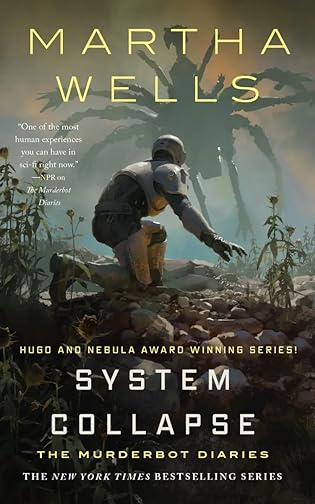 System Collapse (The Murderbot Diaries, #7) by Martha Wells
System Collapse (The Murderbot Diaries, #7) by Martha Wells Format: eARC
Source: supplied by publisher via Edelweiss
Formats available: hardcover, ebook, audiobook
Genres: science fiction, space opera
Series: Murderbot Diaries #7
Pages: 256
Published by Tordotcom on November 14, 2023
Purchasing Info: Author's Website, Publisher's Website, Amazon, Barnes & Noble, Kobo, Bookshop.org, Better World Books
Goodreads
Am I making it worse? I think I'm making it worse.
Everyone's favorite lethal SecUnit is back.
Following the events in Network Effect, the Barish-Estranza corporation has sent rescue ships to a newly-colonized planet in peril, as well as additional SecUnits. But if there’s an ethical corporation out there, Murderbot has yet to find it, and if Barish-Estranza can’t have the planet, they’re sure as hell not leaving without something. If that something just happens to be an entire colony of humans, well, a free workforce is a decent runner-up prize.
But there’s something wrong with Murderbot; it isn’t running within normal operational parameters. ART’s crew and the humans from Preservation are doing everything they can to protect the colonists, but with Barish-Estranza’s SecUnit-heavy persuasion teams, they’re going to have to hope Murderbot figures out what’s wrong with itself, and fast!
Yeah, this plan is... not going to work.
My Review:
The system that is collapsing in Murderbot’s seventh outing is Murderbot’s own – and it’s angsting about it in ways that are not remotely leading to optimal performance. Which in turn is leading to even less optimal performance.
In other words, as we check back into Murderbot’s usually snarkastic consciousness, Murderbot is a mess and doing its best to hide the full depth of its mess from itself. Every time its narrative bumps up against the incident that is causing it all the angst, it retreats into “[redacted]” and tries to work around the dysfunction.
The problem is that Murderbot is NOT truly working around whatever is eating away at it. As much as Murderbot likes to believe it is superior to humans – and it often is in the situations in which it finds itself – when it comes to dealing with its own shit it doesn’t function any better than the rest of us.
Which is reassuring IN a character the reader identifies and follows along with – but not so reassuring TO a character from its own internal perspective – as Murderbot learns to its own increasing dismay. And further degradation of its performance.
It seems like Murderbot is suffering from the SecUnit version of ‘Impostor Syndrome’ – and it’s just as uncomfortable for it as it is for us. Also every bit as panic inducing.
Meanwhile, Murderbot, its fellow snarkastic AI ART – or at least ART’s physically smaller drone as ART itself is a spaceship – and their collective humans are in the process of organizing a recently discovered ‘lost’ colony to resist the political, corporate, disinformation campaign of propaganda and eventual virtual enslavement being propagated by the Barish-Estranza corporation.
But the humans that Murderbot’s humans are attempting to help seem to be far, far from ready to BE helped. There’s a schism. In fact, there are multiple schisms among the human population as a result of alien contamination and mind control. And the resulting desire among the humans to get revenge on each other for what happened when they were being mind controlled.
So no one seems to be telling anyone anything like the information really needed to resolve this mess in a peaceful fashion. Then again, that doesn’t seem all that atypical of the history of the planet in contention – all the way back to the original settlement.
Among all the misinformation and disinformation being bandied about, one of the locals finally admits that there’s another colony on the planet that needs to weigh in on their narrowing options. If that breakaway group can be contacted. If they’re still alive.
And if the Barish-Estranza corporate goons haven’t gotten their hooks in first.
But of course they have, because Murderbot’s luck never runs any other way. But it will have to run as fast as it can to catch up and outwit those corporate operatives any way it can all the while wondering if it’s still capable of doing so at all.
 Escape Rating A-: As I’ve said in pretty much every review of an entry in The Murderbot Diaries except that first joint review of the first three books in the series (All Systems Red, Artificial Condition and Rogue Protocol), this seventh entry in the series is not the place to become acquainted with Murderbot’s brand of snarkasm. Start with All Systems Red. and buckle up for a wild ride.
Escape Rating A-: As I’ve said in pretty much every review of an entry in The Murderbot Diaries except that first joint review of the first three books in the series (All Systems Red, Artificial Condition and Rogue Protocol), this seventh entry in the series is not the place to become acquainted with Murderbot’s brand of snarkasm. Start with All Systems Red. and buckle up for a wild ride.
For those of us who have been following Murderbot’s (mis)adventures from the beginning, this one feels like it starts a bit in the middle – perhaps even more than usual. And the somewhat dystopian, corporate controlled universe that Murderbot inhabits has become complex enough that I felt a bit lost at the beginning.
Which is also somewhat fitting, as Murderbot is definitely kind of lost at the beginning of the story. So a whole lot of this one is Murderbot being uncertain about itself and its competence, dealing with that uncertainty badly – as it deals with all the emotions it claims it doesn’t have. All the while, the situation in which it and its humans are currently endangered is every bit as FUBAR’d as usual.
Murderbot’s only good days are the ones where it gets to watch its space operas in peace – and those days are generally rare. And none of the days since its humans arrived at this colony have been anywhere near that good.
While the foreground story is of Murderbot’s crisis of confidence and its rise to that challenge, the situation in which it takes place is a combination of humans behaving both badly and humanly, and of the desperation of humans on all sides as the verities of their worldview – however terribly and skewed, begin to erode.
Therefore, in the background of the story, it’s clear that Murderbot’s system is not the only one that is collapsing. Its personal collapse is something that can be fixed – or at least dealt with. But the system of corporate hegemony/control/tyranny of this universe is showing signs of its inevitable collapse – a situation that I hope to see come to the foreground in future installments of this series, especially in the two untitled entries yet to come.

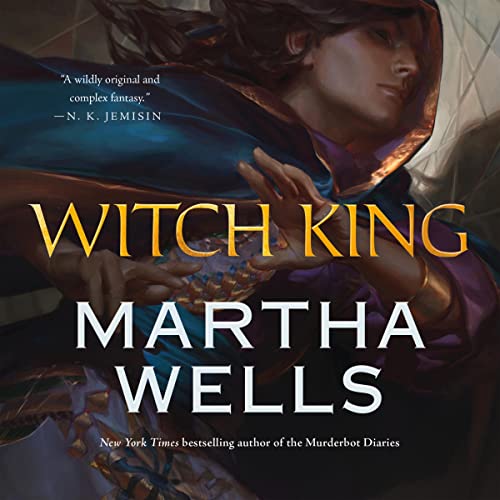 Witch King by
Witch King by  I believe that just how much anyone will like Witch King depends on what you were expecting from it. If you’re looking for more
I believe that just how much anyone will like Witch King depends on what you were expecting from it. If you’re looking for more 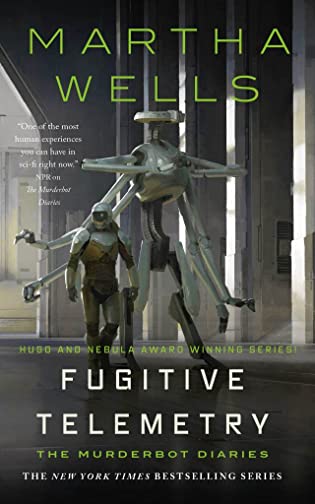 Fugitive Telemetry (The Murderbot Diaries, #6) by
Fugitive Telemetry (The Murderbot Diaries, #6) by 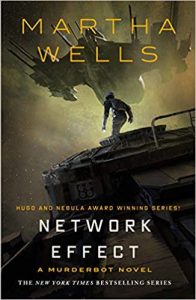 Escape Rating A: If you love Murderbot as much as I do, Fugitive Telemetry is a terrific opportunity to get back in touch with its snark. If you have not yet met Murderbot, this is not the place to begin your acquaintance. Start with
Escape Rating A: If you love Murderbot as much as I do, Fugitive Telemetry is a terrific opportunity to get back in touch with its snark. If you have not yet met Murderbot, this is not the place to begin your acquaintance. Start with 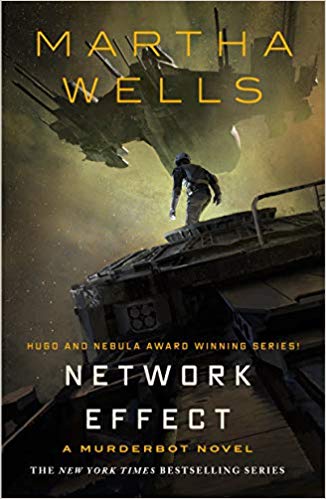 Network Effect (The Murderbot Diaries, #5) by
Network Effect (The Murderbot Diaries, #5) by 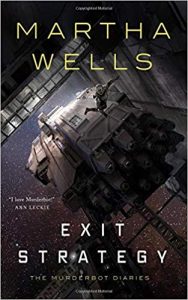 Escape Rating A+: I’ve been waiting for Network Effect for almost two years, and it was well worth the wait. This is one of those reviews where I just want to squee all over the page. This was definitely a one-day read for me. I absolutely could not put it down. At all. Not that I tried very hard.
Escape Rating A+: I’ve been waiting for Network Effect for almost two years, and it was well worth the wait. This is one of those reviews where I just want to squee all over the page. This was definitely a one-day read for me. I absolutely could not put it down. At all. Not that I tried very hard.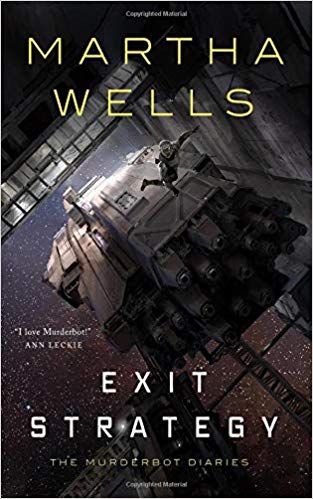 Exit Strategy (The Murderbot Diaries, #4) by
Exit Strategy (The Murderbot Diaries, #4) by 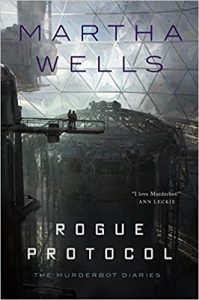 Exit Strategy picks off right where
Exit Strategy picks off right where